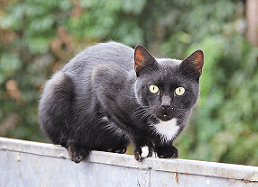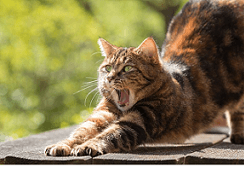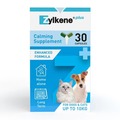Just like humans, cats possess a wide range of personalities. It is easy to forget that animals are capable of such complex emotions because they simply cannot tell us what is wrong and we frequently overlook obvious signs of problems. In fact, up to 10% of euthanised animals are a result of unresolved negative behaviours.
Often, behavioural problems in pets lead to owners relinquishing their animals to shelters or abandoning them because they are unable to solve the issues presented. Unwanted behaviour in cats can range from severe aggression, litter box avoidance, furniture scratching and loud vocalisation to withdrawal and unresponsiveness. Whatever the symptoms, animals deserve to have their problems paid attention to. It is our responsibility as pet owners to ensure the health and welfare of our animals, and it begins with understanding their behaviour.
What causes stress?
 Living alongside humans with busy modern lifestyles can be especially stressful for cats and often we don’t realise that some cats spend much of their lives battling the stresses of our homes and neighbourhoods. Cats are extremely sensitive creatures, favouring routine and familiarity. Many behavioural issues are related to continued disruption of a routine or comfort zone and being an attentive cat owner will help you to improve things for your pet should they show distress.
Living alongside humans with busy modern lifestyles can be especially stressful for cats and often we don’t realise that some cats spend much of their lives battling the stresses of our homes and neighbourhoods. Cats are extremely sensitive creatures, favouring routine and familiarity. Many behavioural issues are related to continued disruption of a routine or comfort zone and being an attentive cat owner will help you to improve things for your pet should they show distress.
Some common stressors include:
- Moving house
- New job or absent owners
- New baby/partner/pet/guests
- Loud noises
- Redecorating/building work
- Strange cats in their territory
- Co-habitation with other cats
- Visiting the vets
The early weeks of a cat's life are crucially linked to how well they cope with stress and anxiety later on. Between 2 to 8 weeks old, kittens should be handled by a range of different people, introduced to dogs and children and be within a stimulating, challenging environment to immunise them to potentially distressing situations.
How do I know if my cat is stressed?
Signs of stress are frequently misinterpreted or ignored by owners. Active responses to stress are often seen as boisterous behaviour, and outbursts of aggression are readily accepted as part of a cat's nature or labelled as 'rough play' by relaxed owners.
Other issues such as regular messing indoors are less problematic for some people than others and are tolerated, leaving stress alerts unnoticed. Passive responses are commonly thought to be part of a cat's quiet or relaxed personality, when in truth the cat has resorted to withdrawing to deal with stress. In either situation, their lives continue along an unpleasant path.
 The most common behavioural complaint related to stress with cats is avoidance of the litter box, going to the toilet around the house and on their owners' belongings. Cats are usually fastidious regarding their toilet habits (either using a litter tray or a particular spot in the garden) and are normally very clean animals, so it is vital to get to the bottom of any change. It is important to note that inappropriate elimination is not a form of revenge or protest.
The most common behavioural complaint related to stress with cats is avoidance of the litter box, going to the toilet around the house and on their owners' belongings. Cats are usually fastidious regarding their toilet habits (either using a litter tray or a particular spot in the garden) and are normally very clean animals, so it is vital to get to the bottom of any change. It is important to note that inappropriate elimination is not a form of revenge or protest.
There are a many reasons that may upset a cat's habits, and you may find that the occasional "accident" is a genuine mistake or a result of upset or fear. If discoveries become regular, thorough investigation and a trip to the vets is required to check both emotional and physical welfare. Whatever the reason, you must not shout at or punish your pet, as this will only make your cat fearful and stressed, making soiling more likely to happen again.
How do I minimise my cat’s stress?
Whether your cat is an active or a passive responder, the catalyst for the behaviours are the same. Understanding how everyday life can affect cats is key to helping them.
- Avoid prolonged stressful situations as much as possible.
- Provide scratching posts and perches – scratching is a cat’s natural form of stress relief as well as helping to keep claws healthy.
- Spend quality time with your pet every day – set aside 15 minutes to cuddle and play with your cat. This will strengthen your bond and relax you both. The better you know your cat, the easier it will be to spot any problems they are having.
- Pheromone therapy (‘pheromonatherapy’) – we stock Feliway spray and diffuser products which have been specially formulated to mimic the natural chemicals (pheromones) produced by cats. Cats produce pheromones to communicate positive messages and mark objects and territories as familiar. Feliway products can be used around the house and in cat carriers, to aid in calming a nervous or stressed cat. feliway is particularly useful in prevention of stress-induced spraying and scratching, and to diffuse stressful situations such as moving house and conflicts with other cats.
If you would like to read the more comprehensive version of this article, visit our Knowledge Base. If you have any advice on dealing with feline behavioural problems, please share it with our other readers! Alternatively, post your comments below or email me directly: [email protected]
Written by: Danielle









